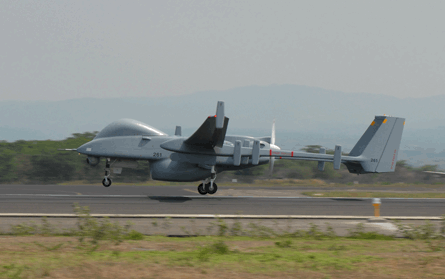Two makers of medium altitude, unmanned aircraft systems that previously battled for a $1 billion US Army contract four years ago are poised for another epic face-off in the US market.
Executives of both General Atomics Aeronautical Systems and Israel Aerospace Industries North America confirm they have responded to a request for information for a maritime patrol UAS by the US Coast Guard.
But both companies are also expecting further interest for the same capability from the Department of Homeland Security and the US Navy.
Thomas Cassidy, president of General Atomics' aircraft systems group, says that he will propose a new maritime patrol version of the Predator B.
Last year, a Lockheed Martin/General Atomics team lost the USN's Broad Area Maritime Surveillance (BAMS) contract with a Predator B fitted with a larger wing for increased range.
 |
|---|
© US Southern CommandIAI expects the US Southern Command to award a follow-on contract to perform operational evaluations of the Heron |
For the forthcoming competitions, General Atomics has chosen to offer a baseline Predator B modified principally with a maritime patrol radar. The company is evaluating radars from five different suppliers for the maritime role, he says.
Despite the USN's plan to acquire the Northrop Grumman RQ-4N Global Hawk for the BAMS requirement, Cassidy says there remains a need for a land-based Predator B performing the maritime surveillance mission. Due to budget earmarks by Congress, the USN already possesses a small fleet of RQ-1 Predator As and MQ-9 Predator Bs.
Meanwhile, Uzzi Rozzen, chief executive of IAI North America, says he will position the Heron as a low-cost alternative to the Predator B.
Rozzen also expects the US Southern Command to award a follow-on contract to IAI to perform an operational evaluation of the Heron in the maritime role.
IAI previously demonstrated the Heron for Southcom during an exercise in Honduras.
In 2005, the General Atomics MQ-1C Sky Warrior beat IAI Heron for the army's extended-range/multipurpose contract. A few months later, the Heron, which then-IAI partner Northrop Grumman called the "Hunter II", also lost a competition against the Predator B for a deal with the US Customs and Border Patrol.
The battle between the Heron and the Predator series then moved overseas, with IAI better holding its ground. Both sides have won some and lost some in the foreign market. Germany, for example, has apparently recently sided with the Heron, Cassidy says.
Source: Flight International























